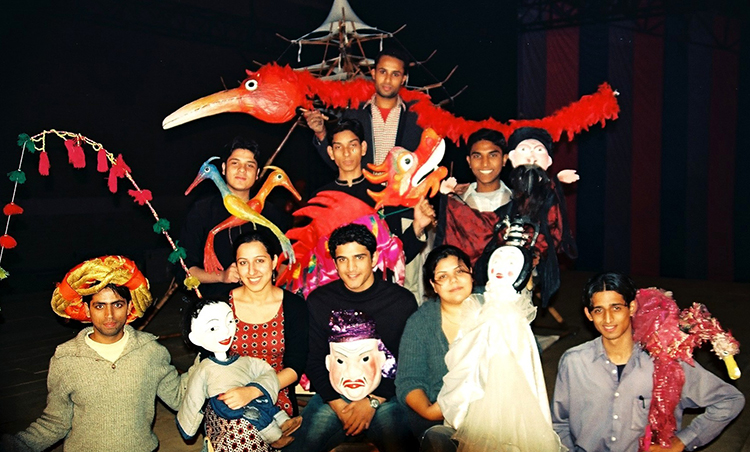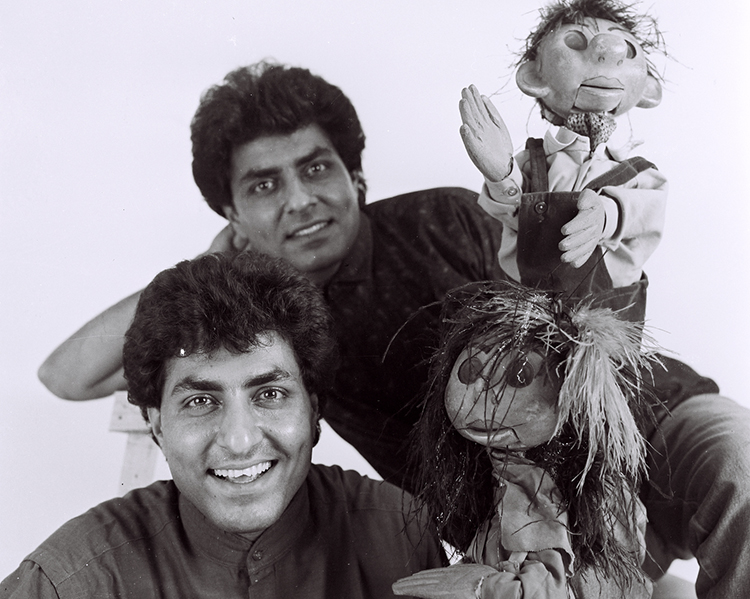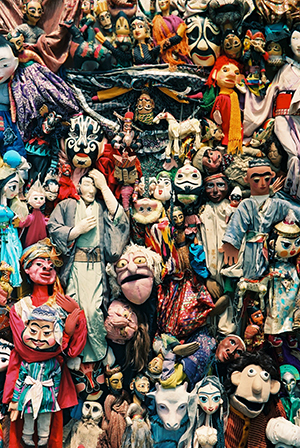
Written by: Momina Mindeel
Posted on: August 19, 2015 | 
The immensely talented Faizaan Peerzada
The world of strings, rods and meticulously moving gloved hands is oddly wonderful. While it stylistically exaggerates some characters, it simultaneously oversimplifies others. Anthropomorphism and other, similar forms of visual arts have long been a source of delight for people of all ages. The art of puppetry has no dearth of talent in a place like Pakistan, yet it continues to undergo a constant state of decline. Given the shaky security situation in the country, people are afraid of visiting open air theatres. As a result, international art festivals are almost nonexistent. Yet, amidst all the bedlam, Rafi Peer Theatre is one name that continues to hold on to this dying profession with the same zeal.
My first acquaintance with the Rafi Peer Cultural Complex was purely by chance. Some years ago, my group of self-proclaimed "food connoisseur" friends felt it was necessary to visit the Peeru’s Café, especially since it offered a Qawwali Night as well. Taking fancy to the cafe’s name, and completely unaware of its exact location, we went out to try it, expecting it to be just another eatery in Lahore. However, the spellbinding Qawwali performance, coupled with a wondrous puppet show and exquisitely delicious cuisine, left us wholly dumbfounded. For ten whole minutes, all I could experience was a warm, subtle sensation of pleasure, gradually moving up my spine.

Adjacent to the café is an open air-theatre with a capacity of approximately 250 to 300 people. Rafi Peer Cultural Complex has successfully held a multitude of international festivals, including the International Folk Puppet Festival, World Performing Arts Festival, Youth Performing Festival, and the International Sufi Soul Mystic Music Festival. This tradition of international festivals came to a halt when a low-intensity bomb hit the nucleus of the complex in May 2010. Since then, the International Folk Puppet Festival has, unfortunately, been reduced to National Folk Puppet Festivals.
Tassneem Peerzada – the Executive Director of the complex – reminisces about the time when people from all over the world would contentedly visit Pakistan for the World Performing Arts Festival. However, following the Lahore attack on the Sri Lankan cricket team in 2009, even art connoisseurs desisted coming to Pakistan. The puppetry industry gradually began to perish. In the midst of all the security tensions plaguing the country, Faizan Peerzada, along with his siblings Usman, Saadan, Imran and Tassneem, as well as a small but determined team of workers, continued functioning in hopes of keeping our puppetry industry alive.

Tassneem Peerzada is the epitome of enthusiasm and commitment. Every word that comes out of her mouth exudes reverence and admiration for the team working in the complex. When enquired about the inspiration behind her work, she manifestly accredits all to her late brother, Faizaan Peerzada. "During the International Festivals, Faizaan would get the building decorated and ornamented just like a newly-wed bride. He would make art students sit and work on their projects day and night, while simultaneously working on his own. This complex would have been fictional without him," she says, with a hint of melancholy, quite clearly visible in her eyes.

Near the end of the complex, adjacent to the open-air theatre, Faizaan Peerzada’s Museum of Puppetry looms large in its entire splendor. Upon entering the museum, visitors are greeted by Japanese puppets, peeping out of the glass windows. The ground floor exhibits a rich collection from all over the world: puppets from Uzbekistan, USA, Switzerland, Sri Lanka, India, Burma, Poland, Australia, Ireland, Czech Republic and a number of other countries, all reside within the same premises. The first and second floors are inhabited by puppets from famous PTV shows including Fun Times, Gul Baqauli, Choti Moti Toyota, Aladdin, etc. The basement, on the other hand, is a working paradise for puppeteers. The place is full of vibrant sketches, wooden boxes, half-cut strips of paper, scattered pieces of foam, vivacious dolls and wooden animals, all wrapped in transparent plastic covers.
The museum of puppetry organizes professional training programs for puppeteers of all ages in order to fill the yawning gap that has been created by the deficiency of formal training institutions in the field.
The Peerzadas have no personal gains to make. The family has been tirelessly working for the promotion of arts and culture for almost four decades now. It is highly refreshing to see that young, educated names like Yamina Peerzada are training themselves in the field of puppetry (Yamina has played the role of the tiny, feisty Rani on PTV’s Sim Sim Hamara as well). The government has wholly turned its back on the profession, as has been the norm in the past. Meanwhile, the glorious Rafi Peer Cultural Complex has stepped up and undertaken the cumbersome task of providing the masses with a permanent hub for the promotion of performing arts and culture in Pakistan.
All images have been provided by Rafi Peer Cultural Complex.
You may also like: